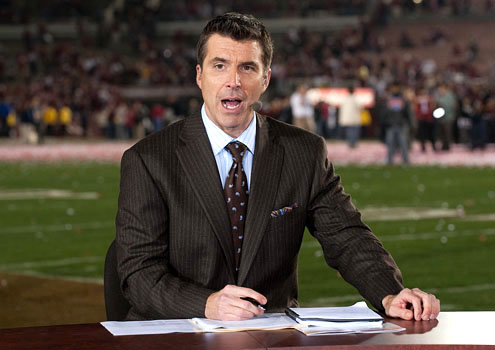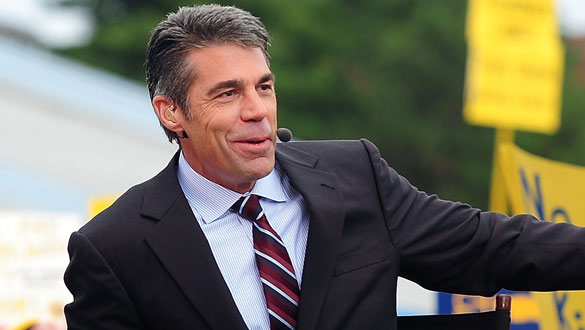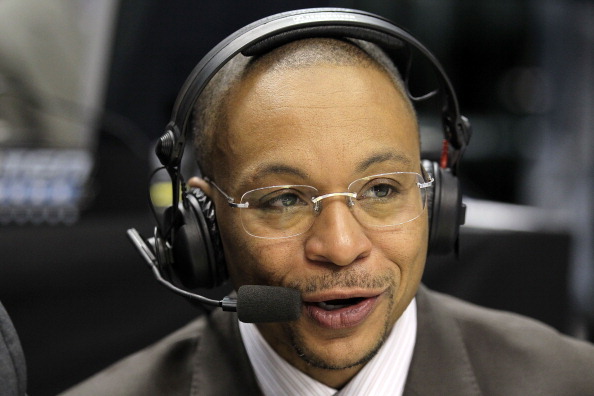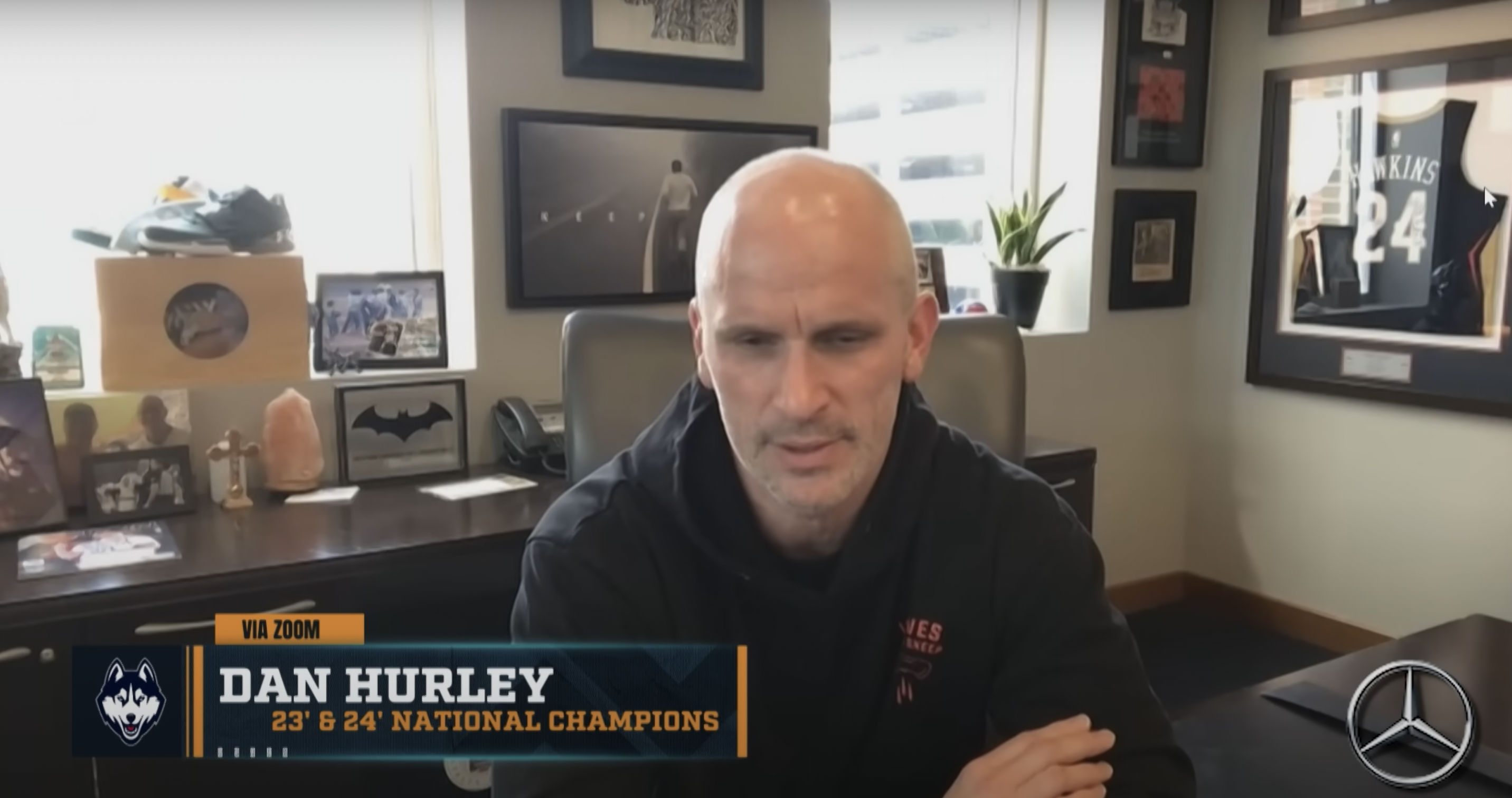Question No. 3: Which program or broadcast could do so much to improve the way college football is discussed on a national level, yet falls short on a regular basis? (This can include a game broadcast.)

Matt Zemek:
It’s College Football Final, and it’s not even close. When writers, broadcasters, and other assorted commentator-pundits finish a long day of work, they turn to CFB Final for discussion, highlights and analysis of games they missed. Rece Davis is an A-plus broadcaster, but having the hyperpartisan Lou Holtz and the puerile Mark May on the set with him constitutes a waste of what could be a genuinely informative hour. ESPN would rather have First Take-level bombthrowing than substantive, illuminating discourse. It’s an awful shame within the context of sports broadcasting. I will occasionally watch CFB Final if an unforgettable game created a special kind of buzz, and I wanted to see how the guys processed it. However, on the two or three occasions per season when I do check the show, it always disappoints. There’s a reason it’s barely on my radar screen anymore.
Terry Johnson:
In a nutshell, I agree with Matt 100 percent. Given the amount of resources ESPN has at its disposal, College Football Final should dominate the market. Since most fans care more about scores than they do about the pregame festivities, there’s no reason this show shouldn’t have higher ratings than even GameDay.
Here’s a simple tweak which will allow that to happen. After Rece, Lou, and Mark review all the games in the top 25, the broadcast would shift to a series of panels to break down what happened in each conference. Each league would have its own panel of experts, and would receive an equal amount of air time. This way, the show will cover all of college football, rather than just a handful of games.
This approach would also provide ESPN with additional college football content throughout the weekend. The network could easily slot in a few “lessons learned” segments into SportsCenter as it leads into NFL Sunday Countdown. In addition, ESPNU could use these spots on Sunday morning as well, giving everyone – even the oft-ignored fan bases of the Sun Belt, MAC, and Conference USA – a chance to find out what yesterday’s action on the gridiron means to them.
For you ESPN execs, who I know are out there listening, you can contact me via Twitter @SectionTPJ. I’m here to help.
Bart Doan:
I feel like if I go with something other than College Football Final, I must be off my rocker since the other three guys have pegged it as basically the Limp Bizkit of college football viewing. I can’t say I watch it, because it’s blathering nonsense and uneven highlights the rare times I have seen it. So we’ll just go with that. I prefer finding some West Coast football fare or just simply calling it a night.
Matt Yoder:
What more needs to be said about College Football Final? The May-Holtz dynamic, and ESPN’s continued insistence to promote their tomfoolery, is simply insane. Rece Davis deserves so much better. From a network that does so many good things in relation to its college football coverage, with an Alabama-esque depth chart of quality analysts, the fact that ESPN thinks May and Holtz arguing and pretending to be lawyers is good television is absurd.
*
Question No. 4: How central is College GameDay to your non-game-watching media diet? If it’s not a part of your viewing habits, has Fox Sports 1 captured your attention instead, or do you not watch GameDay for different reasons?

Terry Johnson:
The only time I watch GameDay is in the final few minutes, and only on those Saturdays when I have a noon Big Ten game on ESPN to cover. The show has become more about pop culture than it is about previewing the games, which is the only reason I would watch a college football show to begin with.
Until the focus of the program is more about who’s going to win and less about what headgear Lee Corso is going to wear, I won’t be tuning in.
Matt Yoder:
Sadly for Fox Sports 1, it captured nobody’s attention, which is why Erin Andrews’ Fox College Saturday was dumped after one year.
To be honest, I know GameDay is still in the upper echelon of studio shows, but I’m usually watching Premier League soccer on Saturday mornings at 10 a.m. ET. Perhaps that says something about the television industry as a whole, but there’s only so much talking one can take in without searching for an alternative. If the choice came down to watching a game or watch people talk, I’m choosing the former every time. I’ll check in on GameDay every now and then if there’s a great feature running or for the picks segment at the end of the show to see Lee Corso do his thing, but it’s not a prime commitment in my viewing habits.
Bart Doan:
College GameDay is the appendix of my personal viewing experience. It’s there. You know it’s there. But at no point do you acknowledge it, use it, and you pray to God you never have to because it means something went terribly wrong. Personally, I cannot remember the last time I watched College GameDay. It has to be at minimum, 5 to 7 to 10 years. I find no reason to pay attention to things that aggravate me and add no value to my life. It’s like hating a band but continually buying their albums.
From what other people tell me, College GameDay has pretty much morphed to a several hour-long infomercial for the SEC. I’m not particularly interested in that either. Others make it sound like it’s basically a roundtable of mothers talking about their kids’ youth soccer teams. Theirs is the best, and don’t even try suggesting otherwise.
Fox Sports 1 has not captured my attention either. I tried it on for five minutes last year and realized that I’d rather do just about anything else than watch it. Nothing about either broadcast is compelling and beautiful Saturday mornings are better spent if not at games, on the golf course.
Matt Zemek:
Is GameDay fun? Sure. Is Chris Fowler an elite superstar-level broadcaster (whose life I want to have, being a huge tennis-and-college-sports guy)? Yes. Is Kirk Herbstreit a quality college football analyst? Without question. Does Tom Rinaldi create great television? Indubitably. GameDay is a fine product… as entertainment. The people on the show know what they’re doing… as entertainers.
However, much as I can respect that a horror film might be done well as a matter of craftsmanship and production, but would not watch that same horror film if I had the chance, so it is with GameDay. It’s the gold standard for its type of program, but few things in the world of sports television interest me less than pregame shows. The play’s the thing, as Shakespeare said, and in a television world with so many choices, I will spend an October or November Saturday watching Tennis Channel’s coverage of a late-season indoor Masters event at 7 in the morning in Seattle. I don’t need to watch a pregame show before the college football day kicks off at 9 a.m. in the West. It’s nothing personal, GameDay. I don’t do horror films or pregame shows.
The one thing GameDay could stop doing (not that it will), however, is to use Lee Corso as a prop. I have found the show’s treatment of Corso to be genuinely dehumanizing at times over the past three seasons. Chris and Kirk are terrific in expressing their affection for Lee both on and off the air, but that doesn’t excuse or wipe away ESPN corporate’s decision to continue to trot out the old man before a camera as little more than a part of the staging and theatrics of the show.
As for Fox Sports 1… well… I still don’t do pregame shows. However, I will certainly pay more attention to studio analysis when I get the chance this season. Getting Bruce Feldman and Stewart Mandel has certainly caught my attention (and respect).
*
Question No. 5: For the regular season, the bowls, or both, what broadcast-media storyline is most likely to capture and maintain your attention?

Matt Yoder:
The entire dynamic of the College Football Playoff selection committee will dominate the news cycle this season. I’m most interested in how the media narratives will have an impact on the committee. It’s a topic I just wrote extensively about at AA. For too long, college football champions have been decided by rankings, narratives, and perceptions instead of reality. For once, we can finally be free in college football of the pollsters setting the tone for the season from the outset.
I want a selection committee that doesn’t just look at Florida State and Alabama as the two best teams in the country as the default until one of them loses. I want the committee to actually rank teams based on what those teams have earned throughout the course of the season and not what they were ranked beforehand.
But we all know it won’t be that easy.
These committee members aren’t going to be in isolation booths throughout the season. Just how much will they allow the narratives, the debates, and the conceptions affect their view of reality? Today’s media thrives on tribalism-fueled debate, and no sport quenches that thirst like college football. Will it be toned down this season now that there’s a selection committee in place and fighting for rankings points don’t matter? Or will it only increase as the pressure grows on individual committee members from lobbyists within the sport?
Bart Doan:
I don’t think we can drink a giant stein of delusion and simply assume with a new system that networks will be able to finally turn on their long-desired tap of objectivity. So the same teams are going to get the same support from the same analysts. The crux of this answer being embedded in what MY above is talking about … and that’s how integral it is to the mindset of the Selection Committee.
Look, biases rule every single decision we make: From the clothing we put on in the morning to the food we buy at the grocery store, we’re showing some sort of bias even when we’re not trying. But the big issue with the AP poll and the Coaches’ Polls over the years is how much viewing do the voters really put into “all” of college football? Or is it easier to pop on highlight shows, fill out a poll, and not have indents in your couch from your backside sitting there all day?
My question will be just how much the Selection Committee eschews the desire to get college football in a microwave and instead slow cook it on the grill. If it’s just plopping on highlight shows and maybe viewing the major game or two of the day, you’ll get the same used cat litter on a plate that you’ve been getting. If the committee members are serious about watching a swath of college football all day long because they take it that seriously, then we’re probably on to something. Eventually, we’ll learn what makes the members of the Selection Committee tick in terms of what they’re looking for. It’d be a damn shame if that was mostly just highlights on Saturday nights.
Matt Zemek:
How ESPN covers the College Football Playoff selection process is an obvious choice, and I’m sure other panelists here will mention it in some form and to some degree. As someone who lives in the West (I’m the only one on the panel who does), an important story for me to follow this season is the Pac-12’s attempt to play more of its games earlier in the day, reducing the late-night Saturday kickoffs a lot of Eastern time zone viewers don’t (or won’t… or, for DirecTV customers, can’t…) watch.
The Pac-12 realized that while it might own the midnight Eastern to 2 a.m. Eastern window on a lot of Saturdays, the ownership of that block doesn’t amount to much. The league saw that it had to command more attention in the heart of the day and early in the evening in order to matter.
It could very well be that this year’s Pac-12 will not produce an elite team which will qualify for the CFB Playoff. (I’m inclined to think that dark scenario has an excellent chance of unfolding. We’ll see.) However, if there’s a close race between the Pac-12 champion and the Big Ten champion for the fourth and final spot (as would have been the case last year between Stanford and Michigan State), it will be fascinating — and significant — to see how the Pac-12’s team is treated in the discussion, regardless of the final outcome.
Terry Johnson:
The most important story this year is the College Football Playoff.
With that in mind, I expect broadcast media to cover it objectively. As Bart pointed out previously, ESPN — and to some degree, CBS — have a vested interest in the SEC’s success. Rather than promote propaganda to earn more dollars, I expect these networks to evaluate the teams from each conference based solely on the merits.
That means the media needs to scrutinize how the Selection Committee attempts to quantify strength of schedule. Remember, unlike the BCS, which used a set formula to measure strength of schedule, the College Football Playoff leaves it up to the individual committee members to determine which team(s) played the toughest slate, and whether its enough to get a team in the field over a conference champion. While the media shouldn’t have any bearing on the final decision, it does have a responsibility to hold the Selection Committee accountable for its actions. If it doesn’t the new playoff system will have absolutely zero credibility.






Comments are closed.